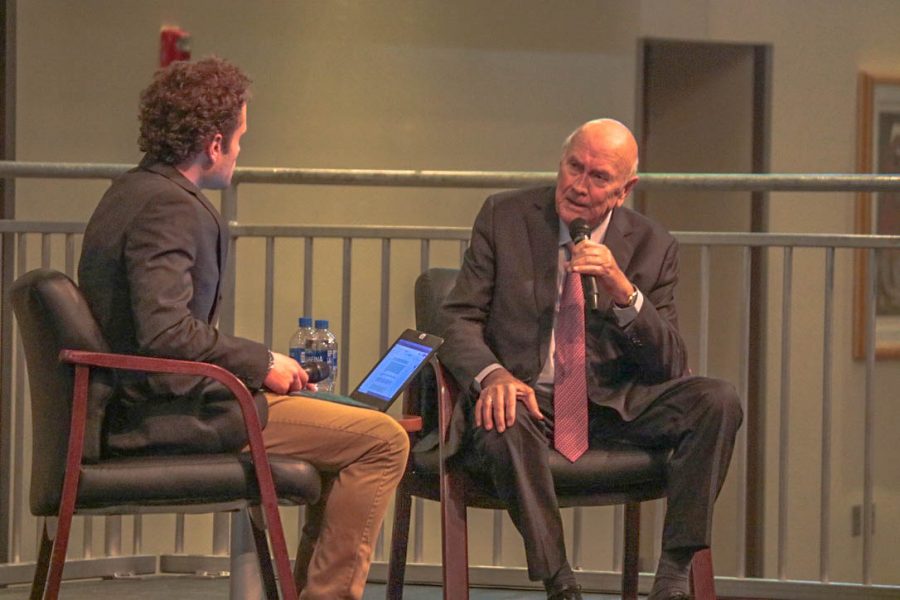De Klerk Appearance Sparks Controversy
Silence is oppression. By not speaking out against misogyny, white supremacy or racial segregation – to name a few – one perpetuates the stigma. Translated as “apartness,” the Afrikaan word apartheid bears a heavy weight on South African culture. Also associated with its political and economic segregation is former South African President F.W. de Klerk.
On Wednesday, the Great Issues Committee invited de Klerk to speak at Saint Louis University. His talk was held at 7 p.m. in the Wool Ballrooms, but unlike other events held in the space, it was relatively empty. Nearly three-quarters of the students who chose to attend wore red in solidarity of the blood shed by apartheid victims. SLU black student groups did not associate de Klerk with his hand in ending apartheid with Nelson Mandela. Rather, they spoke out against his lack of voice in stopping its regime for nearly 20 years, which he played a role in perpetuating as an elected official of the National Party.
“He tried to end his own regime that he started,” Black Student Alliance member Jamila Jackson said. “[De Klerk] was the problem because he arranged for people to be killed. His officers who worked under him killed black people, and he stopped it, which, I guess, was good, but he started it in a sense. He took Nelson Mandela out of jail, but he put him there.”
Jackson was one of several students who questioned de Klerk during the Q&A session of his talk, and who wished he would have addressed his time in power to a greater extent. De Klerk spoke about the benefits of globalization with spurts of historical facts on communist Russia, climate change and the U.S. as a superpower. There was no mention of his time in office as he explained that he “has been speaking in more than 35 of the 50 states of the United States since [his] retirement.” De Klerk addressed how the world is currently in a crisis, which, he saw, warranted more room for dialogue.
Grappling with de Klerk’s paradoxical nature as both a president under apartheid and abolisher of the regime, students – both of color and Caucasian – have tried to reconcile his intentions. Should he be recognized for embracing the white superiority complex as an individual who benefited from apartheid, or as someone who was a product of his society and tried to transition away from his father’s ideals as a former minister?
“I grew up in an era when apartheid was a policy in South Africa,” de Klerk said. “Later in my life as a minister before I became president, I repealed many laws which my father has put on the statute book. It was a hope transition for me. One must look at history in eras: You had in America the era of racial discrimination, which was acceptable and practiced widely, especially in the South. Likewise, we had the same situation in South Africa.”
As minister in the National Party, de Klerk realized apartheid was corrupt and that the injustices brought by it were morally unacceptable. He is referred to as the “last apartheid president,” but de Klerk argued that he should have a different narrative: one which highlights the 100 apartheid laws that he repealed and, regrettably, the “too slow of a process of reform.”
Maybe he would have been better received by the SLU community if his speech did not fall during Black History Month. Black students and faculty previously expressed concern with de Klerk’s attendance, but they perceived his presence as a slap in the face, especially during a month that was supposed to honor their heritage, said senior, Nina Oforji, a member of the Black Student Alliance.
GIC has previously collaborated with BSA on which guest speakers they feel align well with Black History Month. In 2017, poet and Civil Rights Activist Nikki Giovanni spoke about her relationship with Rosa Parks and her role in advocating for the black community.
De Klerk did address his long relationship with Nelson Mandela and how they both worked to overcome tensions to reach the goal of ending racial separation.
“To help us find a resolution to this problem, we would talk together, we would work together, we would rise above those tensions,” de Klerk said. “We worked together for the sake of South Africa. It is a relationship that developed through tensions and through conflicts. Nelson Mandela was prepared to talk to me after 27 years in jail. He showed a remarkable lack of bitterness. If he could talk to me, surely students could listen to me.”
Your donation will support the student journalists of Saint Louis University.

Staunch entered SLU as a Biomedical Engineering major on a Pre-med track, with the intention of continuing her studies in medical school. After a year and a half at SLU, she realized she missed the balance of the arts with sciences as she was previously an editor in her high school yearbook committee.
"Working for UNews, whether it was as Associate News Editor, Managing Editor, or Editor-in-Chief, has taught me the value of working on tight deadlines and how to adequately adapt to certain unexpected situations. The field of Journalism is incredibly fast paced - but that is why I love it so much," Staunch said. "There is always something new occurring, and you would not be able to effectively complete your job unless you had the support of your other editors and staff."
Though paradoxical in nature, she switched her major to Communication. She wants to incorporate both her analytical and creative sides to report on medical topics. Her dream job: to write for Discover Magazine.
When Staunch is not in the newsroom, she is captaining the women’s Ultimate Frisbee team at SLU. She began playing her freshman year and enjoys it as an outlet.




